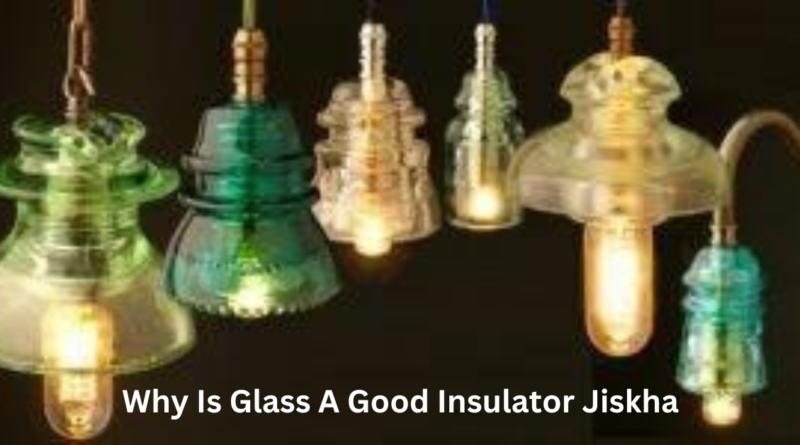Why Is Glass A Good Insulator Jiskha
Glass, a material known for its versatility, has found a remarkable application as an insulator. From its chemical composition to its wide-ranging practical uses, Glass stands out as an exceptional choice in the realm of insulation. Let’s take a deep dive into the world of Glass as an insulator and explore why it is an excellent choice for various applications on Jiskha. Whether you’re a homeowner looking to improve energy efficiency, a scientist conducting experiments, or someone curious about the science behind glass insulation, we’ve got you covered.
The Science Behind Glass Insulation
To truly appreciate the effectiveness of Glass as an insulator, it’s crucial to understand the science that underpins its remarkable properties.
1. Low Thermal Conductivity
Glass boasts a low thermal conductivity, meaning it’s an inefficient conductor of heat. This attribute arises from its non-crystalline, amorphous structure, making heat challenging to pass through. In practical terms, this property ensures that heat is trapped inside where you want it during the colder months and kept out during sweltering summers.
2. High Electrical Insulation
Beyond thermal insulation, Glass excels as an electrical insulator. Its high electrical resistivity prevents the flow of electrical current, making it an indispensable choice in electrical applications where insulation is paramount. Glass insulators have played a crucial role in the safe transmission of electricity for many years.
3. Transparent to Infrared Radiation
One of the standout features of Glass as an insulator is its transparency to infrared radiation. This characteristic allows Glass to trap heat within enclosed spaces while letting in light. It’s no wonder this property is harnessed in energy-efficient windows, greenhouses, and other applications where heat retention is essential.
4. Chemical Stability
Glass is renowned for its chemical stability. It doesn’t readily react with most substances, making it an ideal choice for applications exposed to diverse environmental conditions. This chemical resilience ensures the long-term effectiveness of glass insulators.
Practical Applications of Glass Insulation
Now that we’ve uncovered the science behind glass insulation, let’s explore the myriad practical applications where Glass shines.
1. Home Insulation
Glass takes center stage in residential applications, particularly in windows and doors. Its ability to regulate indoor temperature by trapping heat inside during the colder months and blocking excess heat during the summer translates to tangible energy savings. Homeowners looking to reduce their heating and cooling bills can benefit immensely from insulated Glass.
2. Greenhouses
In agriculture, Glass plays a pivotal role in greenhouse construction. Its transparency to sunlight and infrared radiation creates an optimal environment for plant growth. Glass allows sunlight to permeate while preventing heat from dissipating, ensuring a stable and nurturing climate for plants.
3. Electrical Insulators
The electrical industry relies heavily on glass insulators to support and insulate electrical wires and cables. With its high electrical resistivity, glass safeguards against electrical leaks and ensures the safe transmission of electricity.
4. Laboratory Equipment
Laboratories across the globe rely on glass insulators in various forms, including beakers, flasks, and test tubes. Glass’s stability and non-reactive nature make it the preferred choice for handling chemicals and conducting precise experiments.
5. Energy-Efficient Windows
Modern architecture increasingly incorporates energy-efficient windows crafted from insulated Glass. These windows balance natural light and temperature control, significantly reducing the need for artificial heating or cooling. They not only enhance comfort but also contribute to sustainable living.
6. Fiber Optics
The world of modern telecommunications owes much of its advancement to glass fibers. These fibers, with their low signal loss and high data-carrying capacity, underpin high-speed internet and long-distance communication systems. Glass’s unique properties allow for the rapid transmission of data over long distances.
7. Solar Panels
Glass is a critical component in solar panels, serving a dual purpose. It protects the sensitive solar cells while permitting sunlight to pass through and be converted into electricity. This synergy of functions makes Glass an indispensable component of renewable energy systems.
8. Art and Decor
Beyond practical applications, Glass also finds its place in art and decor. Stained glass windows, intricate glass sculptures, and elegant decorative glassware showcase its aesthetic appeal while retaining its insulation properties.
Frequently Asked Questions (FAQ)
To address some common queries about glass insulation, let’s dive into a set of frequently asked questions.
1. Is all Glass a good insulator?
- While Glass possesses insulating properties, not all Glass is created equal. The effectiveness of Glass as an insulator depends on its composition and manufacturing process. High-quality insulating Glass is specially designed to enhance thermal and electrical insulation.
2. Can Glass insulate sound as well?
- Yes, Glass can provide sound insulation, mainly in double-glazed windows. The air gap between the glass layers helps dampen sound transmission, creating a quieter indoor environment.
3. Are there environmentally friendly glass insulation options?
- Absolutely. Eco-conscious consumers can find environmentally friendly glass insulation options. Some manufacturers utilize recycled Glass in their insulation materials, reducing the environmental impact of production.
4. How can I improve the insulation of my windows with Glass?
- Consider double-glazed or triple-glazed windows with argon gas between the panes to enhance window insulation. This configuration creates a more effective barrier against heat transfer, improving energy efficiency.
5. Is glass insulation fire-resistant?
- The glass itself is not flammable, but the fire resistance of glass insulation varies depending on the specific product. Some glass insulation materials are engineered to be fire-resistant and can withstand high temperatures, adding an extra layer of safety.
6. Can Glass insulate against UV radiation?
- Yes, many types of Glass can block UV radiation. This feature is especially vital in windows to protect indoor furnishings and occupants from harmful UV rays, which can cause fading and skin damage.
7. Is glass insulation suitable for cold climates?
- Glass insulation can be effective in cold climates, particularly when combined with other materials. It helps prevent heat loss and condensation on windows, ensuring a comfortable indoor environment even in chilly weather.
8. Are there DIY glass insulation solutions?
- While some homeowners opt for DIY solutions such as window films or weatherstripping to enhance window insulation, it’s advisable to install insulated Glass professionally for optimal results. This ensures the insulation is effective and long-lasting.
Conclusion
In conclusion, Glass’s unique properties make it a remarkable insulator with applications spanning various industries and everyday life. Whether seeking to reduce energy bills, create a sustainable environment, or conduct cutting-edge experiments, glass insulation has proven its worth. It’s a versatile, reliable, and enduring choice that offers practical and aesthetic benefits. So, embark on your journey to explore the possibilities of glass insulation and embrace its numerous advantages today. Your path to enhanced efficiency, comfort, and innovation begins with Glass.




